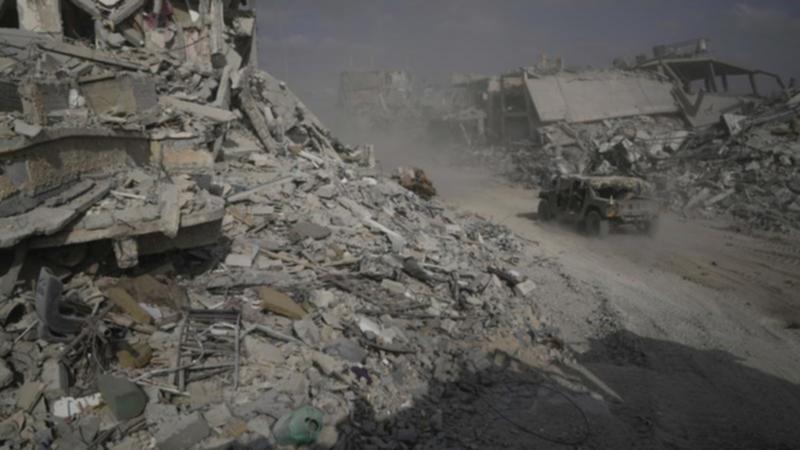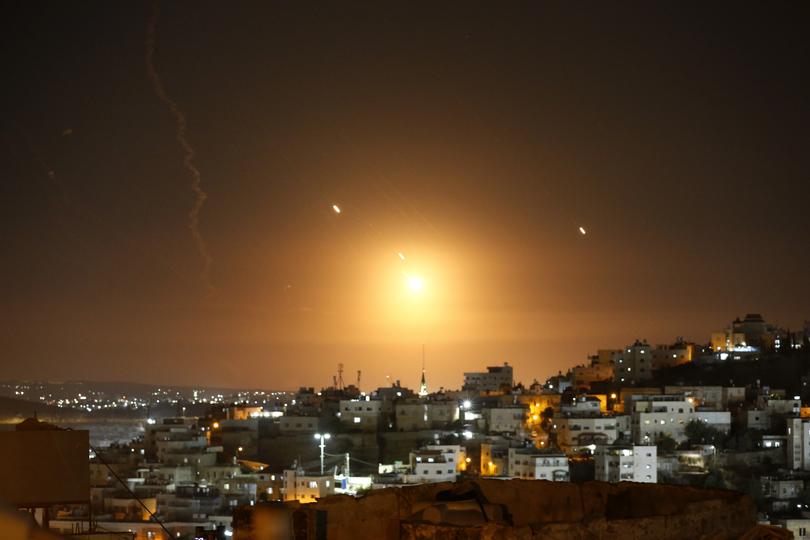THE NEW YORK TIMES: How America can stop a Mideast missile war that everyone will lose
THOMAS L. FRIEDMAN: We really need some creative, coercive U.S. diplomacy right now to finally put an end to both Israel’s and Iran’s colonial projects, which feed each other.

Let’s review the latest headlines: The United States is sending an advanced antimissile system to Israel, along with U.S. troops to operate it. Iran’s foreign minister says there will be “no red lines” governing Iran’s retaliation for any Israeli retaliation for Iran’s latest missile retaliation. And reports from the Persian Gulf say Iran has quietly told Arab gulf states that if Iran is hit by Israel, Iran may respond by striking Arab oil fields.
If all of this does not terrify you, you are not paying attention.
May I make a suggestion?
Sign up to The Nightly's newsletters.
Get the first look at the digital newspaper, curated daily stories and breaking headlines delivered to your inbox.
By continuing you agree to our Terms and Privacy Policy.How about sending our savvy CIA director, Bill Burns, to meet his Iranian counterpart on neutral turf in Muscat, Oman, with a real strategy for coercive diplomacy vis-à-vis Iran that might actually work to change the Iran regime’s behavior? Burns could say to the Iranian intelligence chief something like the following:
“Let me tell you how your country looks from CIA headquarters: You are infiltrated, exposed and isolated.
“Infiltrated? We heard that the latest joke going around Tehran is that your supreme leader is in hiding, and the only ones who know where he is are the Israelis. Israel’s intelligence is very good, but the only reason it could have penetrated your leadership and Hezbollah’s so deeply is that so many Iranian and Lebanese Shiites hate both regimes and are ready to spy for Israel. So you have no idea today when you talk to one another or to Hezbollah whether the person you’re talking to is working for Israel or you.
“Exposed? You, Iran, have fired nearly 500 rockets at Israel since April and did not destroy a single military target or kill a single Israeli soldier. I don’t have to tell you that on April 19, an Israeli airstrike on Iran damaged an S-300 air defense system at the 8th Shekari Air Base in Isfahan. It was reported that Israel had deployed aerial drones and fired at least one missile from a warplane with stealth technology — and you never saw them coming. You are N-A-K-E-D.
“And finally, you are isolated. Israel has badly damaged your Hezbollah militia, in which you have invested billions of dollars, so it is no longer your protection against an Israeli strike on your nuclear facilities. We have inflicted heavy damage on your Houthi militia in Yemen. Syria’s President Bashar Assad is fed up with you and wants you out of his country, and the Arab gulf states are now doing all they can to woo Assad away from Iran. The mainstream Iraqi Shiite party led by Muqtada al-Sadr hates you for the way your regime and militias have stolen so much oil revenue from Iraq and dragged your Iraqi proxies into your fight with Israel. Polls show how unpopular your regime is across the Arab world. Even Vladimir Putin does not want to see you get a nuclear bomb. A nuclear-armed Iran to his south? He’s not that crazy.
“So this is a moment of truth for Iran. You have two paths: Either change your behaviour or risk collapsing under the weight of your own recklessness. But when I say change your behaviour, this time I mean something different from when we negotiated the nuclear agreement with you during the Obama administration.
“We made a mistake back then. We were obsessed with curbing the weapon you were never likely to use — a nuclear bomb, if you could even make one — while ignoring the weapon you were using every day to undermine our interests, the interests of our Arab allies, indeed the interests of most citizens in the region craving stability, not to mention Israel. And that was your implantation of militias armed with increasingly more precise and longer-and-longer-range rockets in Lebanon, Gaza, Syria, Yemen and Iraq. Your proxies crippled those states from the inside and threatened Israel and our Arab allies on the outside.
“We are not playing that game anymore. If you continue using your regional militias to attack Israel and you get into a no-holds-barred missile shootout with Tel Aviv, we are going to protect the Israelis, and you are going to get absolutely hammered. And if you carry out your threat to attack Saudi or UAE oil fields to deter us, or close the Strait of Hormuz, your oil industry will be crushed. And your people will not forgive you. No wonder our intel tells us that you are panicked about an Israeli strike.
“So here is what we propose: an end to Iranian imperialism in Lebanon, Iraq, Syria, Yemen and Gaza in return for our commitment not to bring down your regime, but instead engage with you on building a regionwide collective security arrangement. You pull back, we pull back, and Israel pulls back. But this nonsense of you nurturing failed states in Lebanon, Yemen, Syria and Iraq so that their people can all fight and die while you cheer safely from Tehran — that stops now.
“We are not out to humiliate you. You can call it a win for your regime that the Great Satan has recognized Iran as a necessary part of any regional collective security system. But the arming of Hezbollah, the Houthis and the Shiite militias in Iraq is over. You stop that, and we will get the Israelis to withdraw from southern Lebanon and Gaza. The Lebanese army and a credible, lethal, international force will replace Hezbollah, and an Arab peacekeeping force will replace Hamas. We will also encourage Israel to limit any retaliatory strike against you.
“Otherwise, you are on your own.”
My point is that if we want a peaceful and better Middle East, we need to sharpen the choices for Iran’s clerical leadership: restart nuclear talks, end the supplying of thousands of rockets to its proxies and be able to stay in power — or we will give Israel every weapon in our conventional arsenal, including the 30,000-pound bunker-buster bombs designed to destroy their deeply buried nuclear facilities and the B-2 bombers to deliver them.

As Karim Sadjadpour, Iran expert at the Carnegie Endowment for International Peace, put it: Supreme leader Ali Khamenei “has long believed that continued enmity with America and Israel is more vital to the survival of his regime than rapprochement or reform. For that dynamic to possibly shift, Khamenei must face a profound sense of existential angst, one that convinces him that the current trajectory risks the very collapse of his regime.”
Gen. Kenneth F. McKenzie Jr., the former U.S. Central Command chief, who oversaw the 2020 killing of Qassem Soleimani, the leader of the elite Quds Force within Iran’s Revolutionary Guard, agrees: “Iran may seem unpredictable at times,” he said in The Atlantic, “but it respects American strength and responds to deterrence. When we withdraw, Iran advances. When we assert ourselves — having weighed the risks and prepared for all possibilities — Iran retreats.”
We need to confront Iran with an overwhelming, credible threat of force, coupled with a diplomatic survival pathway out — but one that this time addresses both Iran’s nuclear threat and regional behaviour. Our job is to change Iran’s behaviour; regime change is the job of the Iranian people. I believe the best way for that regime to lose its grip is to deprive it of the oxygen of permanent conflict with Israel and America — and all the excuses that Iran’s clerical tyrants give for why their people are so isolated and impoverished.
But I don’t stop there. We also need to sharpen the choices for Prime Minister Benjamin Netanyahu of Israel. We must not be in the business of making Israel safe so that a radical messianic government can annex the West Bank. If we are going to keep resupplying Israel with missiles and even dispatch U.S.-run missile systems, Bibi needs to purge the settler lunatics from his Cabinet, forge a national unity coalition and agree to open talks with a reformed Palestinian Authority — with a new technocratic Cabinet led by credible leaders like former Prime Minister Salam Fayyad — on a two-state solution.
That would pave the way for the UAE and other moderate Arab states to deploy troops to the Gaza Strip and for Saudi Arabia to normalize relations with Israel and forge a security agreement with Washington.
Let me put this as clearly as I can: This crisis in the Middle East will not end until Israel clearly defines its eastern border and declares that everything beyond it is reserved for a Palestinian state in the West Bank, once Palestinians meet the legitimate security requirements Israel needs to accept a two-state solution. Israel needs to be out of the Jewish settlements business — now. Israel’s creeping West Bank annexation is destroying its legitimacy as a democracy when its self-defence requires all the friends it can get in the region and beyond.
Even more important, though, this crisis in the Middle East will not end until Iran, in effect, defines its western border and declares that everything beyond that is for the Lebanese, Syrians, Yemenis, Iraqis, Israelis and Palestinians to decide — so long as they respect Iran’s legitimate security needs. Iran needs to be out of the Islamic imperialism business.
In short, we really need some creative, coercive U.S. diplomacy right now to finally put an end to both Israel’s and Iran’s colonial projects, which feed each other. That is the necessary but not sufficient condition for defusing the madness in this region. Israel cannot afford to be in a long-term, large-scale missile war with Iran. It is too small. Iran is too big, and the United States is running low on interceptors to protect Israel — should Iran and all its proxies fire on Israel at once. Iran cannot afford to be in a large-scale missile war with Israel because the United States and its allies have run out of patience with its reckless adventurism that is destabilizing the whole region.
This article originally appeared in The New York Times.
© 2024 The New York Times Company
Originally published on The New York Times
